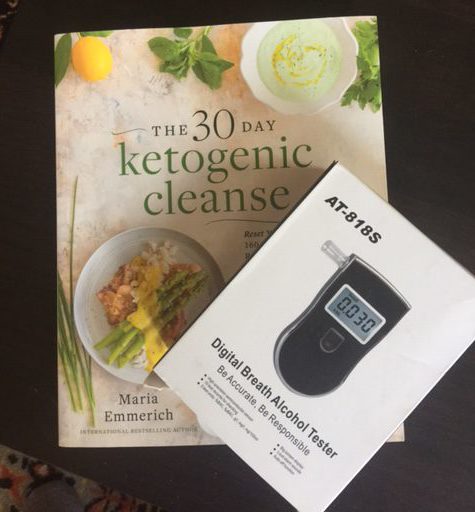Finding out I had SIBO at the beginning of 2017 taught me some important about my body.
Leading up to my SIBO test I was following a Paleo diet, which involved baking lots of “healthy” treats with maple syrup and honey. Baking became a way of managing stress. I would snack on dark chocolate and eat plenty of sweet and white potatoes.
I was not 100 percent Paleo, I would eat gluten occasionally while out. Not often, but a few times a month.
Compared to the standard American diet, I was eating much healthier so I thought I was doing well.
But the combination of the Paleo carbs and the stress of running my business led me to collect fat around my middle. I was not overweight, but my weight was distributed in the unhealthiest place. Belly fat raises chances of developing diabetes, cancer, heart disease and metabolic syndrome.
Because I’m in my mid 40s I to could try to blame the belly fat on age, but that wasn’t the reason. I know because after shifting the carb content in my diet my belly fat melted along with an extra 20 pounds of excess weight. Here’s an after photo below.

SIBO was a wake up call.
Before it, I wasn’t paying too much attention to my diet because my digestion was fine, but there were others signs of imbalance. SIBO raised my awareness and made me pay attention to my body’s reaction to even healthy foods like fruit and sweet potatoes.
The low FODMAP diet I followed for 5 months, was basically a lower carb version of the diet I was eating. Still Paleo but minus the sugars and fermentable carbs. I know it reduced my inflammation because the puffiness in my face went away.
I did not avoid carbs completely, I ate occasional servings of white rice.
My weight was not the only thing that changed. My mood became more stable and my skin started to glow. Of course my symptom of bloating went away and I healed my SIBO in record speed. I learned that perhaps carbs were not my friends and that managing my blood sugar was a vital piece of the puzzle for overall health.
Diabetes and unstable blood sugar run in my family, so it’s no surprise that stabilizing the blood sugar roller coaster made a difference in health and weight.
I stayed low FODMAP for 3 months after I cleared my SIBO in May, to prevent a relapse, and as I started reintroducing FODMAPs with no reaction, I began to experiment with the ketogenic diet.
The ketogenic diet derives a majority of calories from fat.
Many people are afraid of this because fat has been demonized the last few decades as causing heart disease. This was based on faulty science that has already been disproved.
Currently, the ketogenic diet is used medically to treat serious conditions like Alzheimers, arthritis, epilepsy, diabetes and cancer.
Fat is extremely important for brain health, mood and hormone support. The ketogenic diet is very helpful in balancing hormones, improving memory loss and easing PMS.
I’ve been eating a high-fat diet for a while now and my recent blood tests revealed that my CRP (inflammation marker) was extremely low and that my heart and cholesterol markers were doing well.
The aim of the ketogenic diet is to get into ketosis and start producing ketones. You can only know if you are in ketosis if you test for it.
The urine testing strips are notoriously inaccurate. So I bought myself a digital breathalyzer to determine if I’m in ketosis.
Testing is the only way to know if you are producing ketones, which give the ketogenic diet all it’s healing and anti inflammatory benefits.
After much research, I found this digital breathalyzer . It is the cheapest, most reliable and least invasive way to test for ketones. Most testers require blood samples and cost up to $5 per test strip, and good digital breathalyzers average around $200.
My breath tester is under $30, and is an alcohol breathalyzer, but works well for ketone testing. If it read positive for acetone if you haven’t had any alcohol, then congrats, you’re in ketosis!
What’s the benefit of being in ketosis?
The keto diet can help with symptoms of IBS, as well as reduce the underlying over growth and inflammation that causes it.
The keto diet is currently popular with people who want to drop weight. If you have stubborn belly fat or excess weight you can’t drop, this diet works wonders.
If you have digestive or health issues, doing the keto diet under expert guidance is highly advised.
The benefits of the ketogenic diet, often called keto, extend far beyond weight loss. It’s extremely promising for common digestive ailments such as SIBO and candida.
The low carb nature of keto starves misplaced and over grown bacteria and yeast and works in tandem with herbs to balance the biome.
The keto diet switches the body from burning sugar to burning fat. Because ketones are extremely anti inflammatory, they help address inflammatory conditions such as leaky gut.
The ketogenic diet is a high fat, moderate protein and low carb diet. Fat is the primary source of fuel for your body and brain. This is a more efficient and stable source of energy and clears up brain fog, achy joints and fatigue for many people, particularly those with issues exacerbated by unstable blood sugar.
Unstable blood sugar taxes the adrenals, which can cause or exacerbate anxiety, depression and other mood disorders.
Other symptoms that can be resolved by keto are diarrhea, constipation, gas, bloating, headaches and rashes.
Keto is not for you if…
Some people have trouble digesting fats. This usually has to do with liver congestion and sluggish bile production. Bile is produced by the liver and helps the body break down fats.
Supporting the liver with detoxifying herbs and using an oxbile supplement can help the body process fat much better. In these cases it’s always a good idea to start the supplements first and to raise fat consumption very slowly. This should be done under supervision.
This is also not a diet for you if you have severe adrenal and thyroid issues or are underweight and don’t want to lose any more fat.
Testing is key
Getting into ketosis varies based on the person. If you’re not in ketosis and just eating low carb, you won’t feel any ketone benefits as your body is still burning sugar for fuel.
Keto’s popularity has to do with the fact that it makes most people feel energetic, clear and stable.
Even though you’re eating food, ketosis shares the benefits of fasting, where the body begins to burn fat for fuel. This helps the body boost it’s detoxification, as toxins are typically stored in fat cells.
Wondering what a ketogenic diet looks like and how much fat to eat?
If you follow me on Instagram you can see what I eat daily.
If you want to read more about the keto diet and get some great recipes and a meal plan, I suggest this 30 Day Keto cleanse book that I used.
The general guideline is getting 12 servings of fat, 6 servings of protein and 3 servings of carbs a day.
A serving of fat is a tablespoon of mayo, 2 eggs, a tablespoon of coconut oil, or half an avocado. You can also get fat from fatty cuts of meat or fish like salmon or bacon.
It’s important not to eat too much protein on this diet because excess protein will metabolize into sugar. This well know process is called protein gluconeogenesis.
In terms of carbs, it is best to eat lower carb vegetables like leafy greens, cucumbers, eggplant, bell peppers, tomatoes, cabbage, cauliflower, broccoli, nuts and seeds.
Some of these low carb veggies are FODMAPs so check your tolerance before you dive in. While, Dr. Allison Siebecker, the world’s leading SIBO expert, approves of keto as a SIBO-friendly diet, following it strictly will limit food choices, unless you do ok with cruciferous and brassica FODMAP veggies.
The low FODMAP diet should never be a forever diet used to manage life long symptoms. It’s a short term solution for repairing the gut. A long term low FODMAP diet can lower bacterial diversity in the large intestine, which may cause other problems later on.
The ketogenic diet is more sustainable for the long term as long as you eat carbs a few times a week. This is called a “carb up” in the keto world and won’t derail the benefits of ketosis.
Keto will fix issues with blood sugar, insulin imbalance and carbohydrate metabolism so you feel better when you eat carbs.
Right now, I’m learning all about the ketogenic diet and testing it on myself. And it’s working quite well. I’m keeping it balanced and having carbs occasionally.
If you’re interested in learning more about the keto diet for gut repair or symptom relief, leave some questions in the comment section below and I’ll answer them below or in a future blog post.


